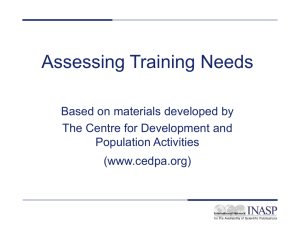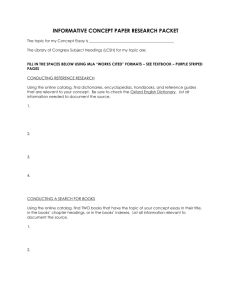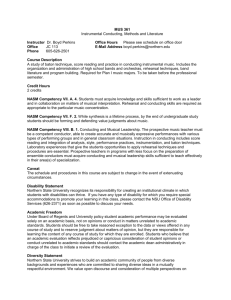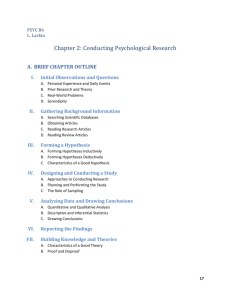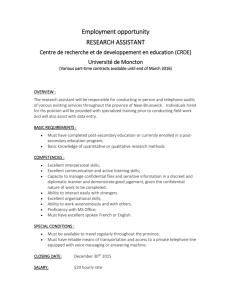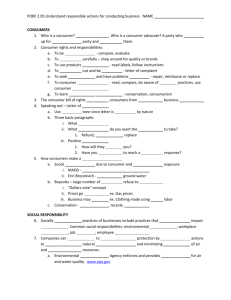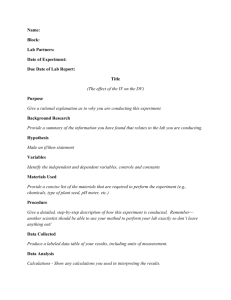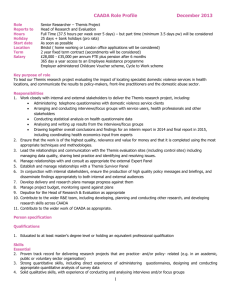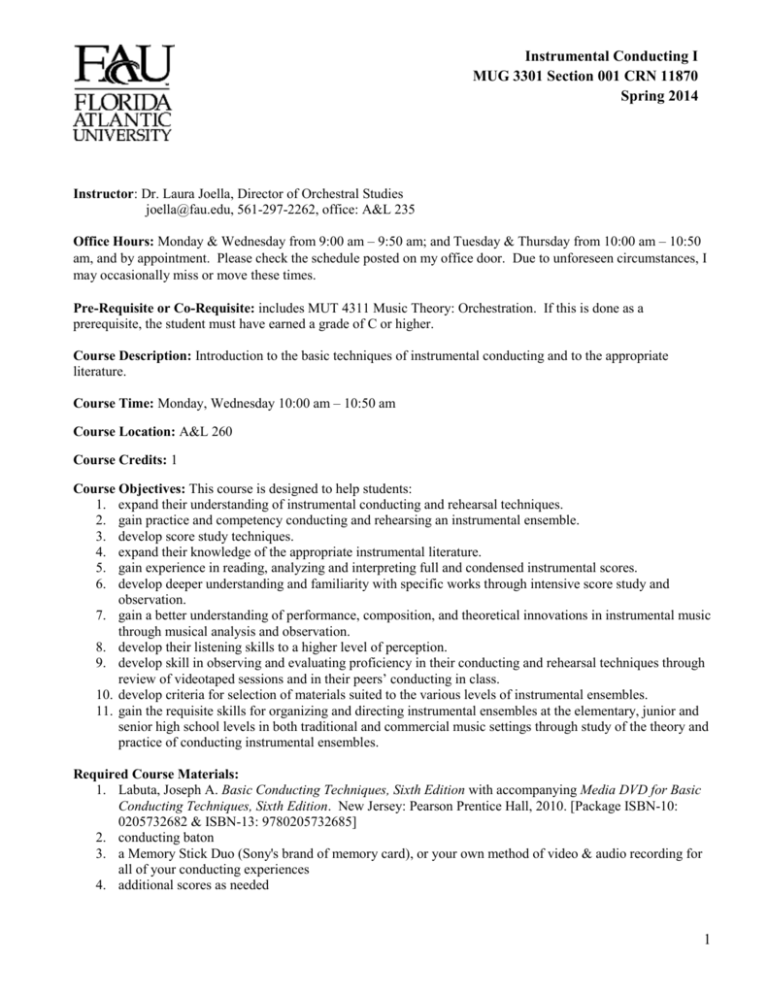
Instrumental Conducting I
MUG 3301 Section 001 CRN 11870
Spring 2014
Instructor: Dr. Laura Joella, Director of Orchestral Studies
joella@fau.edu, 561-297-2262, office: A&L 235
Office Hours: Monday & Wednesday from 9:00 am – 9:50 am; and Tuesday & Thursday from 10:00 am – 10:50
am, and by appointment. Please check the schedule posted on my office door. Due to unforeseen circumstances, I
may occasionally miss or move these times.
Pre-Requisite or Co-Requisite: includes MUT 4311 Music Theory: Orchestration. If this is done as a
prerequisite, the student must have earned a grade of C or higher.
Course Description: Introduction to the basic techniques of instrumental conducting and to the appropriate
literature.
Course Time: Monday, Wednesday 10:00 am – 10:50 am
Course Location: A&L 260
Course Credits: 1
Course Objectives: This course is designed to help students:
1. expand their understanding of instrumental conducting and rehearsal techniques.
2. gain practice and competency conducting and rehearsing an instrumental ensemble.
3. develop score study techniques.
4. expand their knowledge of the appropriate instrumental literature.
5. gain experience in reading, analyzing and interpreting full and condensed instrumental scores.
6. develop deeper understanding and familiarity with specific works through intensive score study and
observation.
7. gain a better understanding of performance, composition, and theoretical innovations in instrumental music
through musical analysis and observation.
8. develop their listening skills to a higher level of perception.
9. develop skill in observing and evaluating proficiency in their conducting and rehearsal techniques through
review of videotaped sessions and in their peers’ conducting in class.
10. develop criteria for selection of materials suited to the various levels of instrumental ensembles.
11. gain the requisite skills for organizing and directing instrumental ensembles at the elementary, junior and
senior high school levels in both traditional and commercial music settings through study of the theory and
practice of conducting instrumental ensembles.
Required Course Materials:
1. Labuta, Joseph A. Basic Conducting Techniques, Sixth Edition with accompanying Media DVD for Basic
Conducting Techniques, Sixth Edition. New Jersey: Pearson Prentice Hall, 2010. [Package ISBN-10:
0205732682 & ISBN-13: 9780205732685]
2. conducting baton
3. a Memory Stick Duo (Sony's brand of memory card), or your own method of video & audio recording for
all of your conducting experiences
4. additional scores as needed
1
Instrumental Conducting I
MUG 3301 Section 001 CRN 11870
Spring 2014
Recommended Course Material:
Green, Elizabeth A. H. The Modern Conductor, Seventh Edition. New Jersey: Prentice Hall, 2004.
ISBN: 0-13-182656-5 and 9-780131-826564
Course Requirements: Participation and preparation are essential in the course! There will be reading
assignments and score study and preparation for almost every class. Students will conduct in class using excerpts
of progressive difficulty. Following each conducting experience in class (which students will videotape), students
are required to fill out and hand in a copy of the self-check mastery test box that is at the end of each chapter in
Labuta’s Basic Conducting Techniques, 6th edition. In addition, following the midterm and final exams (which
students will videotape), a written self-critique is required. It is essential that all assignments be completed on
time. Late papers will not be accepted unless approved by the professor before the deadline. All papers must be
typed! There is a 10 hour instrumental ensemble rehearsal observation requirement. See below for additional
details.
Course Procedure: We will study basic conducting techniques as well as methods for score preparation. We will
then set up an ensemble and begin conducting in class. In order to make this work, it is ESSENTIAL that each
student has all necessary materials (score, parts, video tape, etc.) ready to go at the scheduled time. Every in class
conducting session will be recorded.
Class sessions will be devoted to continued application of conducting and rehearsal techniques, guided discussion,
musical analysis, score study, observation, evaluation, and development of active listening skills through musical
examples and applied conducting.
Grading Methods: See below for details on evaluation of examinations, self-critiques of conducting exams, in
class conducting assignments, self-check mastery tests about in class conducting, quizzes, observation and
reflections paper and the attendance policy.
Examinations: There will be two conducting examinations. MISSED EXAMS WILL NOT BE MADE UP
WITHOUT A WRITTEN DOCTOR’S EXCUSE OR POLICE REPORT DETAILING YOUR
EMERGENCY. There are two options for the mid-term examination. One, the student will prepare and conduct
a significant excerpt from large score in class (class orchestration allowing or with a CD). (You may compose or
arrange your own piece using techniques we have studied, but I must approve the score at least two weeks before
the exam.) Or two, the student will conduct a piece from the Mastery section of the Labuta book (pages 341-373
in the 5th edition, and pages 247-275 in the 6th edition) and transpose parts for Bb, Eb and F instruments (you will
need to bring enough copies to class for all the students on the day of the exam). The final exam will include a
conducting session with either the Symphony Orchestra or the Wind Ensemble. As the conducting final exam is
often during the last rehearsal of the semester for these ensembles, the conducing final exam cannot be made up.
Do not miss your scheduled time. SCORES MUST BE ORDERED ASAP!
Self-critiques of conducting exams: Self-critiques should include both positive observations and areas for
improvement. Please use one inch margins and 12 point Times New Roman double spaced font. Papers that do
not meet the criteria will not receive full credit. A hard copy of your paper is due at the beginning of the next
class period after you conduct. Late papers will not be accepted unless approved by the professor before the
deadline.
2
Instrumental Conducting I
MUG 3301 Section 001 CRN 11870
Spring 2014
The University Center for Excellence in Writing offers a range of free support services at any point in the writing
process (i.e. brainstorming, drafting, revising) to help students become more reflective writers and readers as well
as more self-sufficient crafters of their written work. Please take advantage of this resource and go to
http://www.fau.edu/UCEW/us.htm for additional information.
In class conducting assignments: Students will conduct an ensemble in class using excerpts of progressive
difficulty. It is ESSENTIAL that each student has all necessary materials (score, parts, video tape, etc.) ready to
go at the scheduled time. These sessions will be recorded.
Self-check mastery tests about in class conducting: Following each conducting experience in class (which
students will videotape, see above “In class conducting assignments”), students are required to fill out and hand in
a copy of the self-check mastery test box that is at the end of each chapter in Labuta’s Basic Conducting
Techniques, 6th edition.
Quizzes: There will be two quizzes which will include questions about terminology, transpositions, score order,
seating plans, beat patterns, score interpretation and repertoire.
Observations: Students are required to observe 10 hours of instrumental ensemble rehearsals spaced evenly
throughout the semester (half will be due at the mid-term date). Eligible ensembles include: Symphony Orchestra,
Wind Ensemble, Symphony Band, and high school ensembles of strings, winds or full orchestras. Download the
form for this assignment from BlackBoard. Ask permission from the conductor to observe rehearsal before the
rehearsal begins. Do not interrupt the rehearsal to get their signature, do this before or afterwards. Final
observation forms are due on our scheduled final exam time during finals week. Late papers will not be
accepted. If you are a member of the Symphony Orchestra, Wind Ensemble, or Symphony Band, you can hand in
a copy of your schedule as you will be observing more than the required 10 hours.
Grading Policy: The final grade is a combination of these categories:
Two exams (mid-term and final)
Self-critiques of conducting exams
In class conducting assignments
Self-check mastery tests about in class conducting
Two quizzes
10 hours of observation
Attendance & Participation
30%
10%
10%
10%
10%
10%
20%
Music majors need to earn a C or higher to have this course count towards their degree. Final grades will be
assigned as follows:
100% - 93%
90% - 92%
87% - 89%
83% - 86%
A
AB+
B
80% - 82%
77% - 79%
73% - 76%
70% - 72%
BC+
C
C-
67% - 69%
63% - 66%
60% - 62%
0% - 59%
D+
D
DF
3
Instrumental Conducting I
MUG 3301 Section 001 CRN 11870
Spring 2014
Attendance Policy: In order for us to put together a decent conducting ensemble, it is essential that everyone show
up for EVERY class. Attendance will be taken at every class meeting. Two unexcused absences are allowable but
not encouraged. If you anticipate the need to miss more than two classes, it is advised that you notify the professor
as soon as possible, since any absences beyond the allowable limit will affect your overall grade. Each additional
absence will lower the attendance & participation portion of your grade by 10% points. This will have the
effect of lowering your final grade by 2% points for each additional unexcused absence over two. An
absence will only be excused with proper documentation. The instructor has final say over which excuses and
documentation constitutes an acceptable excused absence. Students involved in any University-approved activity
will be excused with proper documentation from your supervising official. All documentation must be turned in
no later than the day of the final. NO EXCEPTIONS. Departure from class before dismissal will result in a
tardy or absence for that class session as determined by the instructor.
Tardiness: You are tardy if you arrive after class has begun. If you are tardy, it is your responsibility to speak to
the instructor after class to receive any credit for attendance. FOUR tardies equal one unexcused absence. There
is no leniency with this rule.
Procedure for obtaining an excused absence or tardiness: Send the professor an email at joella@fau.edu
detailing the reason and date as soon as you know you will need to miss a class. You will also need to provide
appropriate documentation. If an unexpected tardy occurs, it is your responsibility to see the professor directly
after class, otherwise your tardiness will be considered unexcused. If an unexpected absence occurs, it is your
responsibility to send the professor a detailed email as soon as possible (and follow up with appropriate
documentation), otherwise your absence will be considered unexcused.
Make up/ Late Work: Because the members of the course create an ensemble for students to conduct, missed
classes cannot be made up. Late papers will not be accepted unless approved by the professor before the
deadline. MISSED EXAMS AND QUIZZES WILL NOT BE MADE UP WITHOUT A WRITTEN
DOCTOR’S EXCUSE OR POLICE REPORT DETAILING YOUR EMERGENCY. Any missed exam or
quiz must be made up before the following class meeting. As the conducting final exam is often during the last
rehearsal of the semester for FAU’S ensembles, the conducing final exam cannot be made up. Do not miss your
scheduled time. Make-up quizzes will be taken in the Testing and Evaluation Office (SS210). Their hours are
from 8:00 am – 4:30 pm Monday through Friday. To ensure that you will have enough time to finish the quiz, do
not arrive at the Testing and Evaluation Office any later than 3:30 pm.
Academic Honesty: The providing and/or receiving of any unauthorized assistance related to course requirements
is absolutely prohibited. You are allowed and encouraged to study with other students outside of class, but any
unauthorized assistance received or provided during the course of any graded material will not be tolerated. In
addition, plagiarizing another’s work (i.e., using someone else’s work without proper reference in a writing
assignment) is prohibited. Any violation of this policy will receive a failing grade for that assignment and
possibly for the course as well. Please refer to the Department of Music’s Student Handbook for complete
information on academic irregularities.
Classroom etiquette:
o Students must be respectful, attentive and patient in the classroom environment at all times.
o In accordance with the FAU Rules and Regulations, students are to refrain from all disruptive conduct.
(Disruptive conduct includes but is not limited to: talking during lectures, distracting other students from
classroom activities, phone calls, text messaging, phone camera usage, and any other behavior that
negatively affects the learning environment.)
4
Instrumental Conducting I
MUG 3301 Section 001 CRN 11870
Spring 2014
o
o
o
o
o
Failure to refrain from academic irregularities and disruptive conduct will result in appropriate disciplinary
action.
Students are expected to refrain from the use of handheld Internet or texting devices during class and may
only use computers to aid in note taking. Should a student be found in violation of this etiquette, they will
be asked to leave class and take the absence.
Cell phones should be turned off and put away prior to the start of class.
Additionally, students are asked to sit in the chairs in a proper manner and keep feet from residing on other
furniture.
Out of courtesy to other students and to the professor, students are asked to arrive in a timely manner.
Religious Holiday Accommodation: In accordance with the rules of the Florida Board of Education and Florida
law, students have the right to reasonable accommodations, with regard to admissions, registration, class
attendance, and the scheduling of examinations and work assignments, from the University in order to observe
religious practices and beliefs. Students who wish to be excused from course work, class activities, or
examinations must notify the instructor in advance of their intention to participate in religious observation and
request an excused absence. This notification must occur during the first week of the semester so the course
schedule can be altered for all students if necessary. The instructor will provide a reasonable opportunity to
make up such excused absences.
Incomplete Policy: A grade of Incomplete will be assigned only in the case of extreme emergency or illness.
Course Communication: All electronic communication must originate from a valid FAU email address. This
course uses Blackboard.
Disability Policy Statement: In compliance with the Americans with Disabilities Act (ADA), students who
require reasonable accommodations due to a disability to properly execute coursework must register with the
Office for Students with Disabilities (OSD) -- in Boca Raton, SU 133 (561-297-3880); in Davie, LA 240 (954-2361222); in Jupiter, SR 110 (561-799-8010); or at the Treasure Coast, CO 117 (772-873-3441) – and follow all OSD
procedures. http://osd.fau.edu/
Code of Academic Integrity Policy Statement: Students at Florida Atlantic University are expected to maintain
the highest ethical standards. Academic dishonesty is considered a serious breach of these ethical standards,
because it interferes with the university mission to provide a high quality education in which no student enjoys an
unfair advantage over any other. Academic dishonesty is also destructive of the university community, which is
grounded in a system of mutual trust and places high value on personal integrity and individual responsibility.
Harsh penalties are associated with academic dishonesty. For more information, see
http://www.fau.edu/regulations/chapter4/4.001_Code_of_Academic_Integrity.pdf
Course Schedule:
This schedule is tentative and subject to change. If you miss a class it is your responsibility to make yourself
aware of any changes to the schedule or material covered from someone else in the class.
January 6:
Introduction and overview
Labuta pages v-7
January 8:
Basic conducting techniques and methods of score preparation
5
Instrumental Conducting I
MUG 3301 Section 001 CRN 11870
Spring 2014
Labuta pages 74-97: Analysis and Score Preparation;
Green & Gibson pages xi-7 and 139-141
January 13:
Clefs, transpositions, terminology, score order, seating charts, and bowings
Green & Gibson pages 142-173, 189-196, 217-241
January 15:
continue above
January 20:
NO CLASSES – Martin Luther King, Jr. Day
January 22:
Labuta pages 11-21 and 115-116 [excerpts 1-1 and 1-2]: The Baton, Preparation, Downbeat and
Release; Green & Gibson pages 8-29
[self-check mastery test on Labuta pages 20-21]
January 27:
continue above
January 29:
Labuta pages 22-27 and 117-125 [excerpts 2-1 through 2-10]: Beat Patterns and
Preparations in Tempo, Dynamic, and Basic Style
[self-check mastery test on Labuta pages 26-27]
February 3:
continue above
February 5:
continue above
February 10:
Labuta pages 28-32 and 130-136 [excerpts 3-1 through 3-8]: Preparations and Releases for
All Counts
[self-check mastery test on Labuta page 32]
February 12:
continue above
February 17:
QUIZ 1 [Clefs and Transpositions]
February 19:
Labuta pages 33-35 and 142-146 [excerpts 4-1 through 4-5]: Fractional Beat Preparations
[self-check mastery test on Labuta page 35]
February 24:
continue above
February 26:
continue above
March 3:
NO CLASSES – spring break
March 5:
NO CLASSES – spring break
March 10:
Mid-term conducting exam in class, 5 hour observation sheets due today
March 12:
Mid-term conducting exam in class
6
Instrumental Conducting I
MUG 3301 Section 001 CRN 11870
Spring 2014
March 17:
Labuta pages 36-38 and 148-153 [excerpts 5-1 through 5-6]: Divided Meters;
Green & Gibson pages 29-40
[self-check mastery test on Labuta page 38]
March 19:
continue above
March 24:
continue above
March 26:
continue above
March 31:
Labuta pages 39-41 and 160-167 [excerpts 6-1 through 6-7]: Conducting Musical Styles;
Green & Gibson pages 41-77 and 119-138
[self-check mastery test on Labuta page 41]
April 2:
continue above
April 7:
continue above
April 9:
QUIZ 2 [Terminology and Score Order: Green & Gibson Appendix B p. 222;
Labuta Appendices D & G]
April 14:
Labuta pages 42-49 and 172-183 [excerpts 7-1 through 7-13]: The Fermata;
Green & Gibson pages 84-95
[self-check mastery test on Labuta page 49]
April 16:
continue above
April 21:
continue above
April 23:
continue above, and SPOT forms
Monday, April 28:
Observation sheets due
The final conducting exam will be scheduled at a convenient time for the FAU performing ensembles.
7

